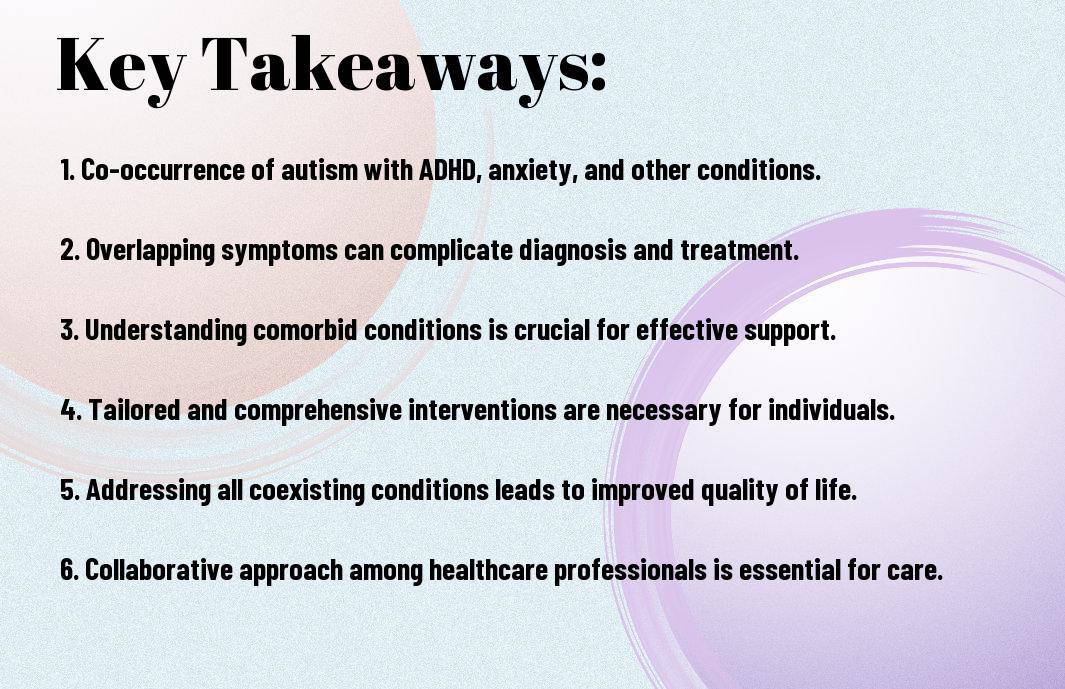Oftentimes, individuals with autism are not only dealing with the challenges that come with their diagnosis, but also with the co-occurring conditions that can further complicate their daily lives. Understanding the intersection of autism and other conditions such as ADHD and anxiety is crucial in providing comprehensive support and care for those affected. It is important to recognise that individuals with autism may also experience other mental health issues, and being aware of these co-occurring conditions is essential in order to effectively address their needs. Despite the complexities and challenges, there are also positive aspects to consider when examining the intersection of autism and other conditions, and it is important to shed light on these as well. In this blog post, we will delve into the intersection of autism and other conditions, exploring the most important, dangerous and positive details of this complex issue.
Key Takeaways:
- Co-occurring Conditions: Autism often co-occurs with other conditions such as ADHD, anxiety, and depression, leading to unique challenges and complexities in diagnosis and treatment.
- Understanding the Intersection: It is crucial for professionals and caregivers to understand how autism intersects with other conditions to provide tailored support and interventions for individuals with multiple diagnoses.
- Integrated Approach: A holistic and integrated approach that addresses the interplay between autism and co-occurring conditions is essential for promoting well-being and improving quality of life for individuals with complex neurodevelopmental profiles.

Co-occurrence of Autism and ADHD
Individuals with autism spectrum disorder (ASD) often experience co-occurring conditions, and one of the most commonly observed co-occurring conditions is attention deficit hyperactivity disorder (ADHD). This co-occurrence presents diagnostic and management challenges, and it is important for professionals and caregivers to understand the intersection of these two conditions.
Diagnostic Challenges and Overlaps
The diagnostic process for individuals with both autism and ADHD can be complicated by the overlap in symptoms between the two conditions. Difficulties in attention, impulsivity, and hyperactivity can be present in both autism and ADHD, making it challenging to differentiate. Furthermore, individuals with autism may also have difficulties with social communication and interaction, which can further complicate the diagnostic process for ADHD.
Management of Dual Diagnoses
When managing dual diagnoses of autism and ADHD, it is essential for healthcare professionals to consider comprehensive and individualised treatment plans that address the unique needs of each individual. Therapies and interventions that target both conditions simultaneously, while also taking into account any co-occurring anxiety or other conditions, can be beneficial in improving the overall well-being of the individual.
Early intervention, specialised education, and support from a multidisciplinary team are crucial in addressing the complexities of managing dual diagnoses of autism and ADHD. Careful monitoring and regular re-evaluation of the individual’s progress are also important in ensuring that their needs are being appropriately met.
Autism and Anxiety Disorders
For individuals with autism spectrum disorder (ASD), anxiety disorders are extremely prevalent. According to a study by the Autism ADHD Foundation, individuals with autism are at a higher risk of developing anxiety disorders compared to the general population. This link between autism and anxiety has become an area of growing concern in the medical and psychological communities.
Prevalence and Impact on Quality of Life
The prevalence of anxiety disorders among individuals with autism is alarming, with studies showing that up to 40% of autistic individuals also meet the criteria for an anxiety disorder. This comorbidity has a significant impact on the quality of life for individuals with autism, often leading to increased social isolation, difficulty in employment, and a higher risk of developing other mental health conditions.
Strategies for Mitigating Anxiety in Autistic Individuals
Strategies for mitigating anxiety in autistic individuals are crucial for improving their overall well-being. It is important to create a supportive environment that includes therapy, sensory-based interventions, and the development of coping skills. Additionally, a personalised approach that takes into account the individual’s specific sensory sensitivities and communication needs is essential in managing anxiety in autistic individuals.
Understanding the intersection of autism and anxiety and implementing effective strategies to mitigate anxiety in autistic individuals is essential for improving their quality of life and mental well-being. By addressing anxiety in autistic individuals, we can help them lead more fulfilling and positive lives, with opportunities for social engagement and personal growth.

Autism in Association with Other Developmental Disorders
When it comes to autism, it is not uncommon for individuals to present with additional developmental disorders. These co-occurring conditions can significantly impact the individual’s overall well-being and may pose increased challenges in their everyday life.
Intellectual Disabilities and Learning Differences
Individuals with autism may also experience intellectual disabilities or learning differences in addition to their autistic traits. This can make it more challenging for them to process information, learn new skills, and interact with their environment. It is crucial to provide tailored support and interventions to address these specific needs and help individuals reach their full potential.
Speech and Language Impairments
Speech and language impairments are commonly associated with autism, affecting the individual’s ability to communicate effectively. These impairments may include difficulties with speech articulation, understanding language, and expressing thoughts and ideas. Early intervention and speech therapy are essential in addressing these challenges and promoting improved communication skills.
Furthermore, social communication difficulties are often intertwined with speech and language impairments, impacting the individual’s ability to engage in meaningful interactions and develop relationships. It is important to recognise the complex nature of these co-occurring conditions and provide comprehensive support to address the diverse needs of individuals with autism.

Medical Conditions Related to Autism
Gastrointestinal Issues and Dietary Concerns
Many individuals with autism also experience gastrointestinal issues such as constipation, diarrhoea, and acid reflux. These issues can significantly impact their quality of life and may exacerbate behavioural symptoms associated with autism. Additionally, dietary concerns are prevalent in individuals with autism, with many exhibiting selective eating habits and sensory sensitivities to certain foods.
Genetics and Neurological Underpinnings
Research has shown that there is a strong genetic component to autism, with many individuals having a family history of autism or related conditions such as ADHD and anxiety. Additionally, neurological underpinnings, including differences in brain structure and function, play a significant role in the manifestation of autism and its co-occurring conditions.
Understanding the interplay between genetics and neurological underpinnings is crucial in comprehending the complex nature of autism and related conditions. This knowledge can inform targeted interventions and treatments to address the specific needs of individuals with autism and co-occurring conditions such as ADHD, anxiety, and gastrointestinal issues.
The Intersection of Autism and Other Conditions (ADHD, Anxiety, etc.)
In conclusion, it is clear that there is a significant intersection between autism and other conditions such as ADHD and anxiety. This intersection poses unique challenges for individuals who are affected by multiple conditions, as well as for their caregivers and healthcare providers. It is crucial to recognise and understand the complexities of these co-occurring conditions in order to provide effective support and interventions. Further research and awareness are needed to better understand the specific needs of individuals with autism and comorbid conditions, and to develop tailored strategies for addressing their diverse needs. By acknowledging the intersection of autism with other conditions, we can work towards a more inclusive and supportive environment for individuals with complex neurodevelopmental profiles.
FAQ
Q: What is the intersection of autism and other conditions?
A: The intersection of autism and other conditions refers to the co-occurrence of autism with other neurodevelopmental or mental health conditions such as ADHD, anxiety, etc.
Q: How common is it for individuals with autism to have other conditions?
A: It is quite common for individuals with autism to have other conditions, with studies showing that around 70-80% of individuals with autism also have at least one other co-occurring condition.
Q: What are some common conditions that intersect with autism?
A: Some of the common conditions that intersect with autism include ADHD, anxiety disorders, sensory processing issues, epilepsy, depression, and intellectual disabilities.
Q: How does the intersection of autism and other conditions impact individuals?
A: The intersection of autism and other conditions can lead to unique challenges and complexities in diagnosis, treatment, and everyday functioning, which can impact various aspects of an individual’s life.
Q: What are the challenges of diagnosing and treating individuals with both autism and other conditions?
A: Diagnosing and treating individuals with both autism and other conditions can be challenging due to overlapping symptoms, the need for comprehensive assessments, and the development of tailored interventions to address the specific needs of the individual.
Q: How can individuals with the intersection of autism and other conditions be supported?
A: Individuals with the intersection of autism and other conditions can be supported through a multidisciplinary approach that addresses the diverse needs of the individual, including access to specialist services, targeted interventions, and holistic support for their overall well-being.
Q: What research is being conducted in the intersection of autism and other conditions?
A: Ongoing research in the intersection of autism and other conditions aims to improve our understanding of the underlying mechanisms, identify effective interventions, and enhance the quality of life for individuals with complex neurodevelopmental profiles.






